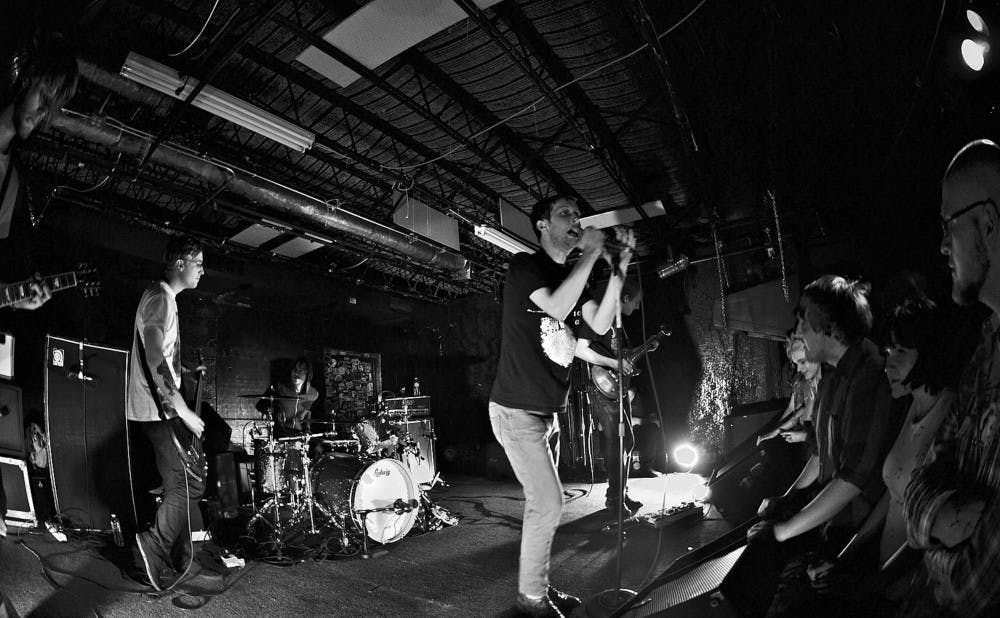Part of a fringe sub-sub-genre lovingly dubbed “The Wave,” La Dispute is a divisive entity with a fiercely loyal following and a way with words. Over 10 years ago, they released their first full-length album, “Somewhere at the Bottom of the River Between Vega and Altair” — an album that turned Japanese folklore into scream-spoken vocals set to all manner of instrumentals influenced by screamo, jazz, prog-rock and punk. Now heralded as “one of the most unique hardcore albums of the century,” “Somewhere” flipped the script on what it meant to be a hardcore or post-hardcore band.
Since then, La Dispute has maintained its reputation for combining hefty, literary lyrics and unconventional melodies that open space for nuanced discussions of life and humanity. Their sophomore LP “Wildlife” — a concept album — marries that intense, heavy La Dispute sound with deeply emotional and compelling lyrics that ponder the capacity for human suffering. A third LP, “Rooms of the House” turns toward fictional characters attempting to navigate the dissolution of their relationship. Although the emotional weight and sonic severity of lyricist Jordan Dreyer’s vocals remained mostly unchanged, the band moved toward some softer and less abrasive melodies on tracks like “Woman (Reading)” and “Woman (In Mirror).”
La Dispute released their fourth full-length album “Panorama” March 22, on a major label this time — Epitaph Records. Founded by Bad Religion’s Brett Gurewitz, the label has been signing punk, hardcore, and emo bands like The Offspring, Converge, and Alkaline Trio since 1981. If fans were worried that the label’s involvement with the record would compromise its lyrical or sonic integrity, they were comforted by prominent producer Will Yip’s role in the project. But La Dispute’s recent signing seems to have left few footprints on this new release, which is, unsurprisingly, just as weighty and poetic as each of their previous releases.
“Panorama” is a landscape more than it is a series of individual songs. Based on the drives Dreyer and his partner often make between their hometowns in Michigan, the album is a road trip spent in Dreyer’s head. As they pass various landmarks that remind his partner of significant losses she and her community have suffered over the years, Dreyer ponders the dearth of loss in his own life. He wonders how he can support his partner through her grief having never experienced his own and at what point his life will be upended by tragedy.
In an interview with Rolling Stone, Dreyer said, “There’s a few different things on the record that I was trying to articulate: How it feels to experience another person’s grief when it isn’t directly yours. And how difficult it can be to find a way to help a person going through something.”
The album opens with Dreyer’s soft-spoken murmur, “Found a body at the rest stop/ Buried in the woods beneath/ The garbage and leaves.” This song (“Fulton Street I”), and “Fulton Street II” after it, go on to detail that drive between Lowell and Grand Rapids, and the memories of tragedy embedded in the asphalt between the two cities. As Dreyer listens to his partner’s stories of car wrecks and found bodies of missing Jane Does, he wonders, “Could I even be half of what you need?” Without a manual for comforting the grieving, he pushes on through the trip, equipped with only his skills of compassion and storytelling. But it is here in this undisguised self-reflection that the deeply personal tone of the album is made, it’s autobiographical nature undeniable.
After a meandering tour of death and our relationship to grief and tragedy, the album closes with a love song, “You Ascendant.” Dreyer wonders how he and his partner will die. “If we could choose the way we leave/ Fill out circles on a ballot sheet/ Vote the way we’ll go...What would we do?” He considers a number of possibilities until he realizes that, most likely, he and his partner will not die at the same time. One of them will leave first, and one will be left behind. But maybe their love will live on in the memories they leave behind.
In a track-by-track discussion of “Somewhere,” La Dispute drummer Brad Vander Lugt mentions crowd-favorite “The Castle Builders” — a blatantly optimistic song about friends and positive relationships. “We are not our failures,” Dreyer shouts. “We are only the extent to which we love.”
Of the song, Vander Lugt said “This [track] has a really outspokenly positive message, especially towards the end… We haven’t really written a song in this way since that.”
Dreyer responds, “There’s not a lot of uplifting songs in our catalogue...Maybe we need to write another positive song.”
Eleven years after “The Castle Builders,” and La Dispute has yet to write a song as outwardly uplifting. But, if you look, you’ll find that same positivity in most of the songs in their catalogue.
“Panorama” is no exception. At its core, it is about connection and love — the most fundamental tenet of any La Dispute album.
Get The Chronicle straight to your inbox
Signup for our weekly newsletter. Cancel at any time.

